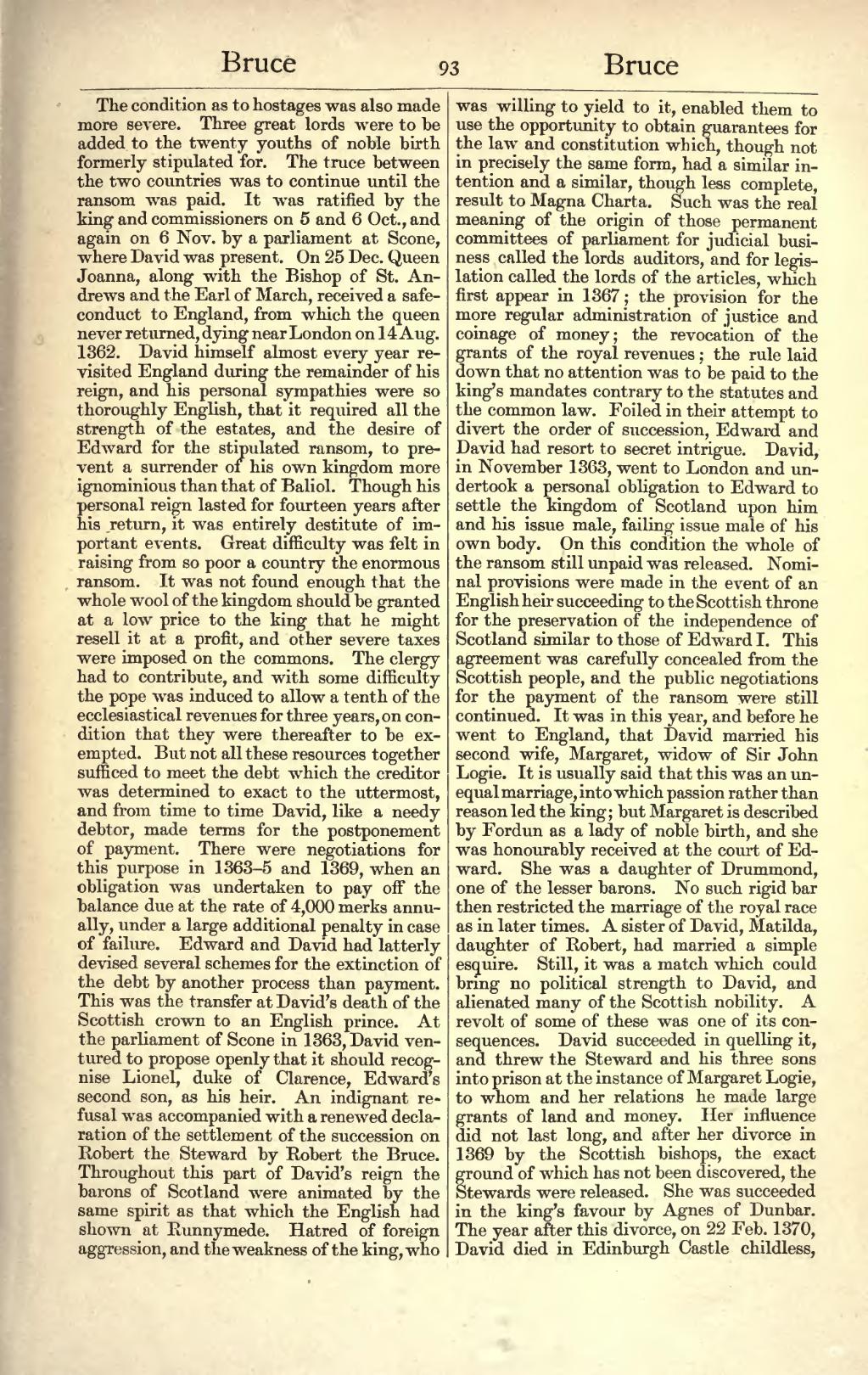The condition as to hostages was also made more severe. Three great lords were to be added to the twenty youths of noble birth formerly stipulated for. The truce between the two countries was to continue until the ransom was paid. It was ratified by the king and commissioners on 5 and 6 Oct., and again on 6 Nov. by a parliament at Scone, where David was present. On 25 Dec. Queen Joanna, along with the Bishop of St. Andrews and the Earl of March, received a safe-conduct to England, from which the queen never returned, dying near London on 14 Aug. 1362. David himself almost every year revisited England during the remainder of his reign, and his personal sympathies were so thoroughly English, that it required all the strength of the estates, and the desire of Edward for the stipulated ransom, to prevent a surrender of his own kingdom more ignominious than that of Baliol. Though his personal reign lasted for fourteen years after his return, it was entirely destitute of important events. Great difficulty was felt in raising from so poor a country the enormous ransom. It was not found enough that the whole wool of the kingdom should be granted at a low price to the king that he might resell it at a profit, and other severe taxes were imposed on the commons. The clergy had to contribute, and with some difficulty the pope was induced to allow a tenth of the ecclesiastical revenues for three years, on condition that they were thereafter to be exempted. But not all these resources together sufficed to meet the debt which the creditor was determined to exact to the uttermost, and from time to time David, like a needy debtor, made terms for the postponement of payment. There were negotiations for this purpose in 1363-5 and 1369, when an obligation was undertaken to pay off the balance due at the rate of 4,000 merks annually, under a large additional penalty in case of failure. Edward and David had latterly devised several schemes for the extinction of the debt by another process than payment. This was the transfer at David's death of the Scottish crown to an English prince. At the parliament of Scone in 1363, David ventured to propose openly that it should recognise Lionel, duke of Clarence, Edward's second son, as his heir. An indignant refusal was accompanied with a renewed declaration of the settlement of the succession on Robert the Steward by Robert the Bruce. Throughout this part of David's reign the barons of Scotland were animated by the same spirit as that which the English had shown at Runnymede. Hatred of foreign aggression, and the weakness of the king, who was willing to yield to it, enabled them to use the opportunity to obtain guarantees for the law and constitution which, though not in precisely the same form, had a similar intention and a similar, though less complete, result to Magna Charta. Such was the real meaning of the origin of those permanent committees of parliament for judicial business called the lords auditors, and for legislation called the lords of the articles, which first appear in 1367; the provision for the more regular administration of justice and coinage of money; the revocation of the grants of the royal revenues; the rule laid down that no attention was to be paid to the king's mandates contrary to the statutes and the common law. Foiled in their attempt to divert the order of succession, Edward and David had resort to secret intrigue. David, in November 1363, went to London and undertook a personal obligation to Edward to settle the Kingdom of Scotland upon him and his issue male, failing issue male of his own body. On this condition the whole of the ransom still unpaid was released. Nominal provisions were made in the event of an English heir succeeding to the Scottish throne for the preservation or the independence of Scotland similar to those of Edward I. This agreement was carefully concealed from the Scottish people, and the public negotiations for the payment of the ransom were still continued. It was in this year, and before he went to England, that David married his second wife, Margaret, widow of Sir John Logie. It is usually said that this was an unequal marriage, into which passion rather than reason led the king; but Margaret is described by Fordun as a lady of noble birth, and she was honourably received at the court of Edward. She was a daughter of Drummond, one of the lesser barons. No such rigid bar then restricted the marriage of the royal race as in later times. A sister of David, Matilda, daughter of Robert, had married a simple esquire. Still, it was a match which could bring no political strength to David, and alienated many of the Scottish nobility. A revolt of some of these was one of its consequences. David succeeded in quelling it, and threw the Steward and his three sons into prison at the instance of Margaret Logie, to whom and her relations he made larger grants of land and money. Her influence did not last long, and after her divorce in 1369 by the Scottish bishops, the exact ground of which has not been discovered, the Stewards were released. She was succeeded in the king's favour by Agnes of Dunbar. The year after this divorce, on 22 Feb. 1370, David died in Edinburgh Castle childless,
